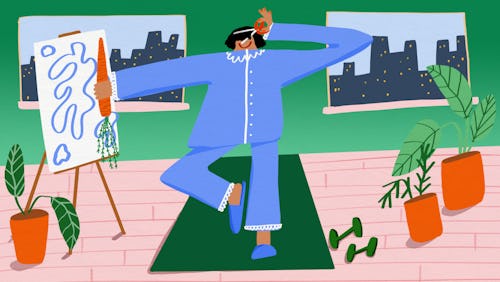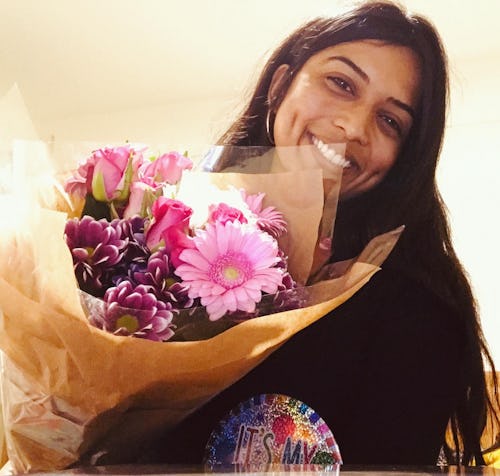
Remember the quarantine glow ups of 2020? After we were all collectively sent to our rooms to think about what we had done to deserve the hellscape of pandemic America, a lot of people decided they needed to change for the better. For some people, that meant a physical transformation. For others, the pandemic makeover was spiritual. And then were those who embarked on extensive DIY adventures. All the while, I assumed that there was just no way we could keep up all these elaborate self-improvement rituals once we go back into the world, but that whatever we needed to do to survive COVID was cool.
When I asked people around the country to tell me about how their pandemic makeovers were holding up, I was expecting an inbox overflowing with sad stories of failed businesses and weight regained. I am delighted to report that I was wrong. It turns out that some of those lockdown induced self-improvement campaigns have had lasting results.
“In August 2020 I started practicing at-home yoga after experiencing several months of mental health issues,” Amanda Renkel, a 30-year-old ESL teacher in Nashville, tells me. As a seasoned yoga teacher, I waited expectantly for the sad follow up. I cannot count the number of people who’ve told me that yoga changed their life on a Sunday but had totally forgotten by Tuesday, and practicing at home is notoriously hard. Most folks really need the accountability of having a teacher to push them and cheer them on. But, Renkel was able to keep herself accountable by signing up for an online yoga challenge every month.
“I have practiced daily yoga for the entirety of this year,” Renkel says. Now, she says, she’s starting to practice at a local studio and thinking about doing a yoga teacher training to deepen her practice. “I somehow managed to get through the worst of the last two years or so using yoga to help manage my anxiety and depression and to feel more like myself.”
Feeling more like yourself can be a spiritual endeavor, but it can also be an aesthetic one. “Sitting at home for days on end, I started thinking about what makes me happy,” said Ethan Reynolds, a social media director in Los Angeles. The conclusion that Reynolds came to was that two things that made him happy were feeling beautiful and pleasing his husband. “As vain as it sounds, I thought it would be worthwhile to invest in myself,” says Reynolds. So he got a hair transplant — a.k.a. plugs.

Look, before you break out any preconceived notions about cosmetic procedures, you should know that shaming people for having “work done” is bullshit. Research shows that aesthetic plastic surgery can have some important mental health outcomes. And that’s exactly what it did for Reynolds. “I have always been really insecure about my looks,” he explains, “But I learned that beauty really is a mental game because [the surgery has] totally changed my confidence.” Not only does Reynolds feel like he looks better, he feels happier. And, unlike some difficult-to-maintain rituals, he doesn’t have to worry about upkeep. “It's still going well because I didn't do a makeover at the gym,” says Reynolds.
Some of the pandemic makeovers people told me about were more holistic and less dramatic — but still very satisfying to hear about. “My quarantine makeover was a mixture of external and internal changes both to my physique, eating habits, and overall wellness,” Dashaun Gasque, a 32-year-old communications manager in Hollywood, tells me. At the beginning of the pandemic, Gasque took a good, hard look at his life and decided to make some changes. “I didn't have great checks and balances to keep myself mentally healthy,” he says. He left a job he describes as “toxic” and instead of using the time to try to get back into the rat race, he started his own business and made small, daily changes to his lifestyle.

Gasque switched up his workout routine and started paying attention to what he was eating. He made stricter boundaries for himself around work and started taking more time to himself. He prioritized rest. Basically, Gasque slowly and methodically made tiny shifts until he found that his mysterious holy grail: balance. “The shift has been great,” Gasque tells me. “I am in the best shape of my life, eating the healthiest I've ever eaten and the most relaxed I've ever been.”
Some people resisted the whole idea of a “glow up,” but had some personal transformations that ended up changing their lives. “For me, lockdown was sort of the opposite of a glow up,” says Cynthia Hass, a 28-year-old California-based producer. “I used it more to rest and learn how to take breaks.” Hass's new emphasis on rest wasn’t exactly a choice at first. She spent most of the lockdown in the U.K., where public safety measures were a lot stricter than they were in the U.S. and she just couldn’t eat out the way she was used to.

Before the pandemic, Hass was ambitious to the point of exhaustion. She worked a full-time job while being a full-time student, sometimes slept only a few hours a night, and prioritized productivity. She said that she had kind of closed herself off to love, but that the pandemic forced her to pay more attention to her relationships, her health, and learning to find a sense of inner equanimity. “I talked to my partner a lot, played online games and explored hobbies,” she describes. She also read a lot, did yoga, cooked three meals a day, and often fell asleep at night Facetime chatting with her boo. And then some things started to click for her.
“What I learned about myself in less busy times is that I have to have a sense of purpose or belief in my life,” says Hass. “I have to find stability in myself.” This subtle shift from external gains to finding internal stability and it’s made her happier and more creative. “When lockdown first started, I felt shame or guilt making time for [hobbies and rest]”, says Hass. “Normally I'd spend time alone working, but today I'm realizing, 'ah it's all a part of it.' You can spend eight hours a day working, then take 10 minutes to do a puzzle or an hour to cook, or 20 minutes to catch up with someone you love. It won't kill you. It might even make you more creative.”







